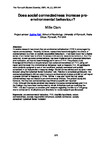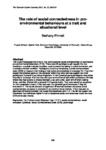Does social connectedness increase pro-environmental behaviour?
| dc.contributor.author | Clark, Millie | |
| dc.date.accessioned | 2021-07-08T20:03:00Z | |
| dc.date.available | 2021-07-08T20:03:00Z | |
| dc.date.issued | 2021 | |
| dc.identifier.citation |
Clark, M. (2021) ‘Does social connectedness increase pro-environmental behaviour?’, The Plymouth Student Scientist, 14(1), pp. 529-544. | en_US |
| dc.identifier.uri | http://hdl.handle.net/10026.1/17323 | |
| dc.description.abstract |
Extensive research has shown that pro-environmental behaviour (PEB) is encouraged by nature connectedness. Recently, however, researchers have investigated the effects of connectedness to others on socially responsible behaviours. It has been found that a higher sense of connectedness to others increases one’s socially responsible behaviour. A similar construct, known as social connectedness, has been implemented in prosocial behaviours and motivation, yet has not been investigated in terms of PEB. The present study investigated the effects of situational and trait social connectedness on PEB, using self-report and the novel Pro-Environmental Behaviour Task to measure PEB. 90 participants were randomly assigned to one of two conditions (socially connected and socially ostracised) in an independent measures design. Social connectedness and ostracism were induced using the Cyberball Social Exclusion Task. Relative to ostracised participants, the connected participants did not select more pro-environmental choices and did not self-report a greater number or frequency of PEBs. Further, it was also found that trait social connectedness was not related to pro-environmental choices. The present study did, however, find that trait connectedness was linked to specific self-reported PEBs. Although the results provided new insights into social connectedness and PEB, the findings may have been confounded by certain limitations such as modifying the PEBT. It is also important to consider prior research regarding the identity of the group one is connected to. Implications and directions for future research are discussed. | en_US |
| dc.language.iso | en | en_US |
| dc.publisher | University of Plymouth | en_US |
| dc.rights | Attribution 3.0 United States | * |
| dc.rights.uri | http://creativecommons.org/licenses/by/3.0/us/ | * |
| dc.subject | pro-environmental behaviour | en_US |
| dc.subject | PEB | en_US |
| dc.subject | biophilia hypothesis | en_US |
| dc.subject | nature connectedness | en_US |
| dc.subject | socially responsible behaviours | en_US |
| dc.subject | socially connected | en_US |
| dc.subject | socially ostracised | en_US |
| dc.subject | Cyberball Social Exclusion | en_US |
| dc.title | Does social connectedness increase pro-environmental behaviour? | en_US |
| dc.type | Article | en_US |
| plymouth.issue | 1 | |
| plymouth.volume | 14 | |
| plymouth.journal | The Plymouth Student Scientist |





